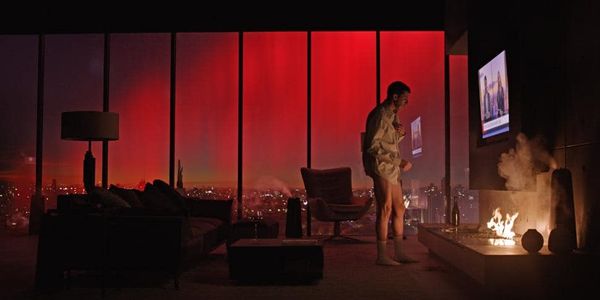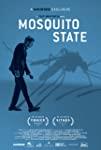Eye For Film >> Movies >> Mosquito State (2020) Film Review
Mosquito State
Reviewed by: Jennie Kermode

It's one of the most tired lines of the 21st Century and no less frequently spoken for the fact that it's completely untrue: "Nobody saw the crash coming." In fact indications that something was seriously wrong were being widely, if not formally, discussed among traders by the autumn of 2007. Many had long been nervous about the distortions created by subprime mortgages; others suspected that key hedge funds were seriously overvalued; and still others, though they couldn't quite figure out why, saw patterns that just didn't fit with what they had been conditioned to expect. With so many assets precariously balanced, it would only take a tiny thing to trigger a swarm of movement among investors, a flurry of urgent sales which could bring the whole thing down. A butterfly flapping its wings, perhaps - or a mosquito.
With a credit sequence with mingles the imagery of Medieval art with time lapse footage of the early life cycle of mosquitos, set to a pulsing, string-heavy score, Filip Jan Rymsza's Mosquito State wastes no time in creating an atmosphere of import and dread. It delivers its most impressive sequence right at the beginning, as we follow one of those mosquitos into adulthood, where it visits an upscale New York party and alights on the neck of trading algorithm designer Richard (Beau Knapp), a man who is, at the time, hunched over a buffet, himself taking on a shape which parallels that of the insect. She (only the females bite) hitches a ride back to his place under his shirt collar as elegant young winery manager Lena (Charlotte Vega) makes the same journey at his side in a limousine. As the mosquito goes looking for still water where she can lay her eggs, Lena expresses her awe at Richard's vast apartment, offers some decorating tips, tries to persuade him to drink something from his wine collection, and politely conceals her despair at his lack of social skills.
The rest of the film concerns itself with the aftermath, and with the spiral of despair into which Richard falls as he realises both how little he knows and how desperately change is needed. As he clumsily tries to make up for his mistake with Lena, his relationship with the film's original heroine - and her numerous children - flourishes. All he needs to understand what they want can be found on the internet. Realising that something is going seriously wrong with the markets leads to a series of hostile stand-offs at his work on Wall Street, but when he gets home, the increasingly loud humming of tiny wings reassures him that order is possible and that he can form a part of a healthy, functioning ecosystem. Healthy, that is, from the system's point of view. There is no place here for what we normally understand as a healthy human mind.
One of those horror films which basically says "Here is the world. You might not like it very much," Mosquito State also has a seductive beauty rooted in its sense of justice and natural order. That first mosquito bite leaves Richard with a seriously swollen face and over time he will come to look increasingly disfigured (one can only imagine the physical discomfort involved for Knapp), yet Rymsza takes a fascinating approach to filming this, never employing the visual language of the monstrous, rather observing him in the same way that he observes the furniture in the apartment. The only time the gaze becomes more personal is when looking at Lena, which serves to enhance the effect of Vega's intelligent, very precise performance. Though she keeps a cautious distance so as not to be overwhelming, the little patch of warmth and brightness that she provides creates its own ripple effect, further prompting Richard to question the life he has been living.
With the presentation of the body thus kept in check, the film's horror is primarily existential, focused on human frailty at both an individual and societal level, and underscored by the real suffering and loss of life that occurred when the crash finally happened. There is also a focus on climate change. Lena is interested in water; Richard has studied bees; both are looking at the first clear signs of collapsing ecosystems. Mosquitos, at the time, were entering New York City in growing numbers; they have since become well established, happy in the heat, carrying a number of new diseases with them.
The film's distanced, sometimes esoteric approach does nothing to diminish the sense of threat, which is immense in some scenes and never really goes away, tension building throughout as we observe the growing swarm in Richard's apartment and know what it must ultimately mean for him (just as he watches trading patterns and feels the same dread). There are moments which prompt one to question whether or not the mosquitos are real, or whether their numbers have been exaggerated in this unbalanced man's imagination. Perhaps it doesn't matter. The use of classic images from centuries' worth of art acts as a constant reminder that we are talking about something bigger. Viewers may find themselves thinking of the work of Peter Greenaway, and indeed, there are few other parallels for a work which puts so much focus on art direction and pulls in off so well.
Mosquito State will no doubt be considered too slow and obscure by some viewers. So much happens that it might easily be perceived as nothing. Did those trades that changed the world ever amount to something real? Where do we locate what matters between vast, beautiful ideas and pain and flesh and blood?
Reviewed on: 24 Aug 2021
















